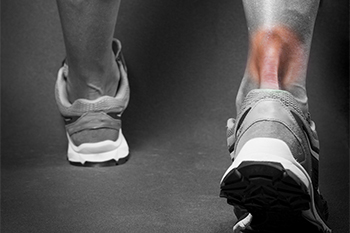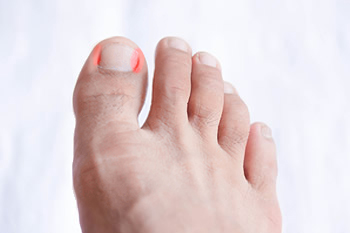Ainsley Roberson Rusevlyan, DPM
(252) 946-1181Washington, NC
 The Achilles tendon is the large tendon at the back of the ankle that connects the calf muscle to the heel bone. One common injury that occurs with the Achilles tendon is a rupture. This can either be a partial or a complete tear of the tendon, and it usually occurs during sporting activities like basketball and tennis, where pushing off and sprinting is frequent. While Achilles tendon ruptures can happen to anyone, they tend to affect males and people between the ages of 30 and 40. Other patients who are at a high risk for ruptures include those with poor flexibility, an inactive lifestyle, or who are on steroid medications. Achilles tendon ruptures are often indicated by abrupt pain in the affected area, the feeling of getting kicked in the back of the leg, weakness and bruising in the area, and a potential “popping” sound. Patients who may have ruptured their Achilles tendon, or would like information on preventing future ruptures, should consult with a podiatrist.
The Achilles tendon is the large tendon at the back of the ankle that connects the calf muscle to the heel bone. One common injury that occurs with the Achilles tendon is a rupture. This can either be a partial or a complete tear of the tendon, and it usually occurs during sporting activities like basketball and tennis, where pushing off and sprinting is frequent. While Achilles tendon ruptures can happen to anyone, they tend to affect males and people between the ages of 30 and 40. Other patients who are at a high risk for ruptures include those with poor flexibility, an inactive lifestyle, or who are on steroid medications. Achilles tendon ruptures are often indicated by abrupt pain in the affected area, the feeling of getting kicked in the back of the leg, weakness and bruising in the area, and a potential “popping” sound. Patients who may have ruptured their Achilles tendon, or would like information on preventing future ruptures, should consult with a podiatrist.
Achilles tendon injuries need immediate attention to avoid future complications. If you have any concerns, contact Ainsley Rusevlyan, DPM of InStride Roberson Footcare. Our doctor can provide the care you need to keep you pain-free and on your feet.
What Is the Achilles Tendon?
The Achilles tendon is a tendon that connects the lower leg muscles and calf to the heel of the foot. It is the strongest tendon in the human body and is essential for making movement possible. Because this tendon is such an integral part of the body, any injuries to it can create immense difficulties and should immediately be presented to a doctor.
What Are the Symptoms of an Achilles Tendon Injury?
There are various types of injuries that can affect the Achilles tendon. The two most common injuries are Achilles tendinitis and ruptures of the tendon.
Achilles Tendinitis Symptoms
Rupture Symptoms
Treatment and Prevention
Achilles tendon injuries are diagnosed by a thorough physical evaluation, which can include an MRI. Treatment involves rest, physical therapy, and in some cases, surgery. However, various preventative measures can be taken to avoid these injuries, such as:
If you have any questions please feel free to contact our office located in Washington, NC . We offer the newest diagnostic tools and technology to treat your foot and ankle needs.
 One of the most important factors for keeping the feet healthy and free of issues is wearing shoes that are the right size. Because your feet can shift in your shoe while standing, make sure there is approximately half an inch between the end of the big toe and the start of the shoe while sitting. It is also important to try on the shoes with the same pair of socks that you intend to wear them with, and shop for shoes in the afternoon so you can get a better idea of the fit, since the feet expand throughout the day. Lastly, if you find a pair of shoes that are perfect, but are slightly too big, wearing insoles with them may help the shoe fit better. If you have any other questions in regards to the importance of making sure your shoes fit correctly, don’t hesitate to reach out to a podiatrist.
One of the most important factors for keeping the feet healthy and free of issues is wearing shoes that are the right size. Because your feet can shift in your shoe while standing, make sure there is approximately half an inch between the end of the big toe and the start of the shoe while sitting. It is also important to try on the shoes with the same pair of socks that you intend to wear them with, and shop for shoes in the afternoon so you can get a better idea of the fit, since the feet expand throughout the day. Lastly, if you find a pair of shoes that are perfect, but are slightly too big, wearing insoles with them may help the shoe fit better. If you have any other questions in regards to the importance of making sure your shoes fit correctly, don’t hesitate to reach out to a podiatrist.
Finding a properly-fitting shoe is important in reducing injuries and preventing foot problems. For more information about treatment, contact Ainsley Rusevlyan, DPM from InStride Roberson Footcare. Our doctor will treat your foot and ankle needs.
Proper Shoe Fitting
A common concern when it comes to foot health, having properly fitted shoes can help prevent injuries to the foot. Out feet affect our posture and gait, which in turn affects the biomechanics and overall bodily structure. With 33 joints, 26 bones, and over 100 ligaments, the potential for serious injury is much greater than one realizes. Although the feet cease growth in adulthood, they still change shape as they mature. Here are some factors to consider when it comes to investing in proper fitting shoes:
Keeping in mind how shoes fit the biomechanics of your body, properly-fitting shoes are vitally important. Fortunately, it is not difficult to acquire footwear that fits correctly. Be sure to wear shoes that support the overall structure of your body. Do your feet a favor and invest in several pairs of well-fitted shoes today.
If you have any questions please feel free to contact our office located in Washington, NC . We offer the newest diagnostic and treatment technologies for all your foot and ankle needs.
Read more about Proper Shoe Fitting When the toenail curls downwards and into the skin surrounding the nail, it is referred to as an ingrown toenail. Common signs of an ingrown toenail include pain, redness, and swelling. Ingrown toenails can become infected if they are not treated. Ingrown toenails can form from a variety of reasons, such as shoes that are too tight, not properly trimming the toenails, excessively sweaty feet, or trauma to the toe. Patients who are struggling with an ingrown toenail may be able to find relief by soaking their feet in warm water for around 15 minutes a few times a day. However, ingrown toenails that persist should be looked at by a podiatrist in order to prevent an infection.
When the toenail curls downwards and into the skin surrounding the nail, it is referred to as an ingrown toenail. Common signs of an ingrown toenail include pain, redness, and swelling. Ingrown toenails can become infected if they are not treated. Ingrown toenails can form from a variety of reasons, such as shoes that are too tight, not properly trimming the toenails, excessively sweaty feet, or trauma to the toe. Patients who are struggling with an ingrown toenail may be able to find relief by soaking their feet in warm water for around 15 minutes a few times a day. However, ingrown toenails that persist should be looked at by a podiatrist in order to prevent an infection.
Ingrown toenails may initially present themselves as a minor discomfort, but they may progress into an infection in the skin without proper treatment. For more information about ingrown toenails, contact Ainsley Rusevlyan, DPM of InStride Roberson Footcare. Our doctor can provide the care you need to keep you pain-free and on your feet.
Ingrown Toenails
Ingrown toenails are caused when the corner or side of a toenail grows into the soft flesh surrounding it. They often result in redness, swelling, pain, and in some cases, infection. This condition typically affects the big toe and may recur if it is not treated properly.
Causes
You are more likely to develop an ingrown toenail if you are obese, have diabetes, arthritis, or have any fungal infection in your nails. Additionally, people who have foot or toe deformities are at a higher risk of developing an ingrown toenail.
Symptoms
Some symptoms of ingrown toenails are redness, swelling, and pain. In rare cases, there may be a yellowish drainage coming from the nail.
Treatment
Ignoring an ingrown toenail can have serious complications. Infections of the nail border can progress to a deeper soft-tissue infection, which can then turn into a bone infection. You should always speak with your podiatrist if you suspect you have an ingrown toenail, especially if you have diabetes or poor circulation.
If you have any questions, please feel free to contact our office located in Washington, NC . We offer the newest diagnostic and treatment technologies for all your foot care needs.
Read more about Ingrown ToenailsPlaying sports is a great way to stay active and physically fit. However, it is important to practice a few precautionary methods to keep yourself safe and injury free. Take the extra time to stretch, warm up, and cool down properly. This alone will help you avoid many injuries. Staying hydrated will keep muscles from getting cramped and tense, which can lead to strains and tears. Learning the proper form and technique necessary to perform your sport will reduce the risk of fractures and other injuries. You can help avoid Achilles tendon injuries by strengthening your calves and cross-training. Another important prevention method is to wear the right athletic shoe for the sport you are playing, and make sure the shoe matches your foot type and that it fits properly. Always replace shoes that become worn down at the heel and tread. Make an appointment with a podiatrist for more advice on footwear, stretches and other preventative tips to avoid sports injuries.
Exercising your feet regularly with the proper foot wear is a great way to prevent injuries. If you have any concerns about your feet, contact Ainsley Rusevlyan, DPM of InStride Roberson Footcare. Our doctor will treat your foot and ankle needs.
How to Prevent Running Injuries
Many common running injuries are caused by overuse and overtraining. When the back of the kneecap starts wearing out and starts causing pain in your knee, this is commonly referred to as runner’s knee. Runner’s knee is a decrease in strength in your quadriceps and can occur if you’re not wearing properly fitted or supporting shoes. To prevent runner’s knee, focusing on hip strengthening is a good idea, as well as strengthening your quads to keep the kneecaps aligned.
What Are Some Causes of Running Injuries?
- One cause of a common running injury is called iliotibial band syndrome.
- Plantar fasciitis is also another common injury.
- Stress fractures can occur from overtraining, lack of calcium, or even your running style.
Best Ways to Prevent Running Injuries
- Wear footwear that fits properly and suits your running needs.
- Running shoes are the only protective gear that runners have to safeguard them from injury.
- Make a training schedule. Adding strengthening exercises as well as regular stretching can help keep you strong and limber and can lessen the possibility of injuries.
- Stretching keeps muscles limber; this will help you gain better flexibility.
If you have any questions please feel free to contact our office located in Washington, NC . We offer the newest diagnostic and treatment technologies for all your foot and ankle needs.
People with diabetes are at an increased risk for developing foot ulcers and a variety of other foot problems. This is because diabetes can cause poor circulation, nerve damage, and immune insufficiency. Without an adequate blood supply, innervation, and a strong immune response, even small injuries on the feet can go undetected in their initial stages, heal poorly, and become infected. Taking very good care of your feet is essential if you are diabetic. At home, check your feet daily for any cuts, scrapes, sores, bruises, or other abnormalities and treat them as soon as possible. Take any excess pressure off your feet, especially if you have a foot wound, by resting or wearing an orthotic or off-loading device. You should also be under the care of a podiatrist who can monitor your foot health and treat any problems as soon as they occur.
Diabetic foot care is important in preventing foot ailments such as ulcers. If you are suffering from diabetes or have any other concerns about your feet, contact Ainsley Rusevlyan, DPM from InStride Roberson Footcare. Our doctor can provide the care you need to keep you pain-free and on your feet.
Diabetic Foot Care
Diabetes affects millions of people every year. The condition can damage blood vessels in many parts of the body, especially the feet. Because of this, taking care of your feet is essential if you have diabetes, and having a podiatrist help monitor your foot health is highly recommended.
The Importance of Caring for Your Feet
Patients with diabetes should have their doctor monitor their blood levels, as blood sugar levels play such a huge role in diabetic care. Monitoring these levels on a regular basis is highly advised.
It is always best to inform your healthcare professional of any concerns you may have regarding your feet, especially for diabetic patients. Early treatment and routine foot examinations are keys to maintaining proper health, especially because severe complications can arise if proper treatment is not applied.
If you have any questions please feel free to contact our office located in Washington, NC . We offer the newest diagnostic and treatment technologies for all your foot and ankle needs.